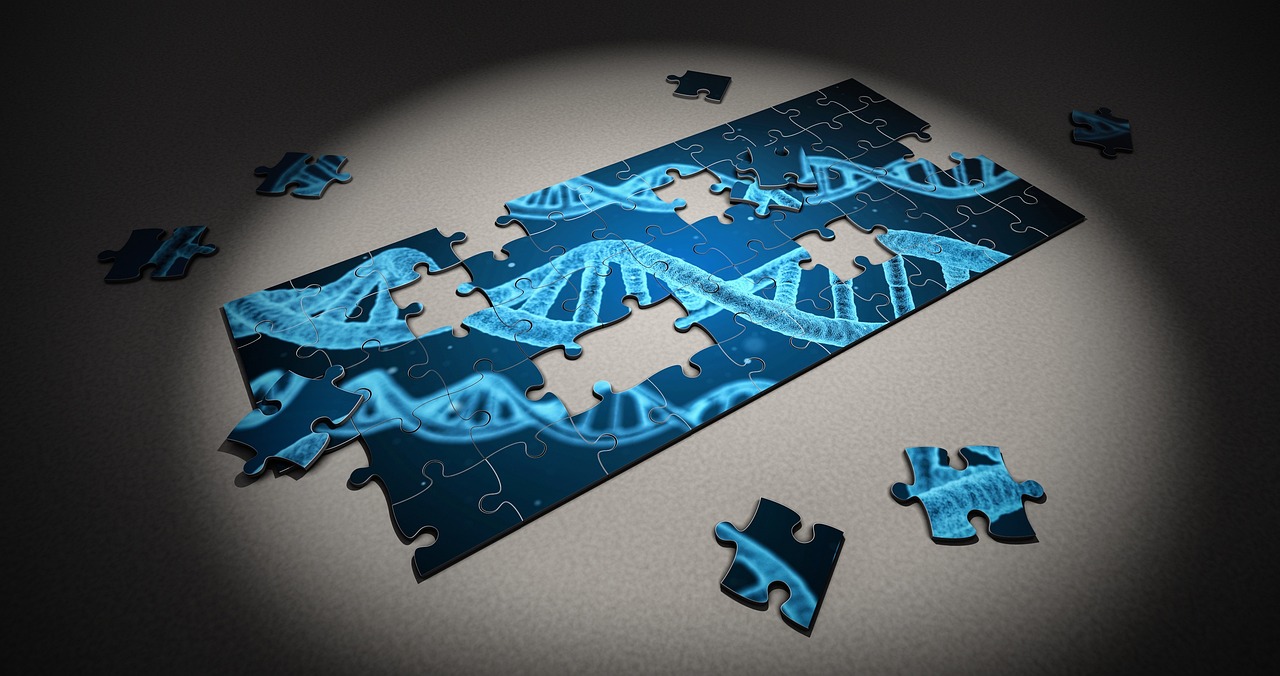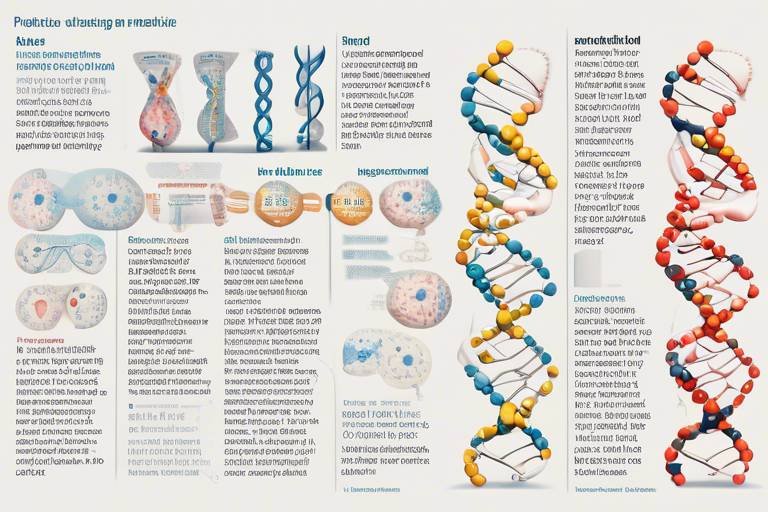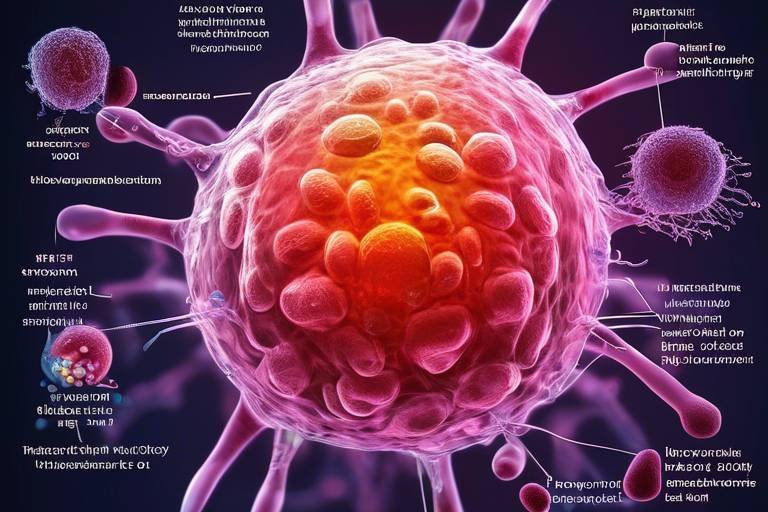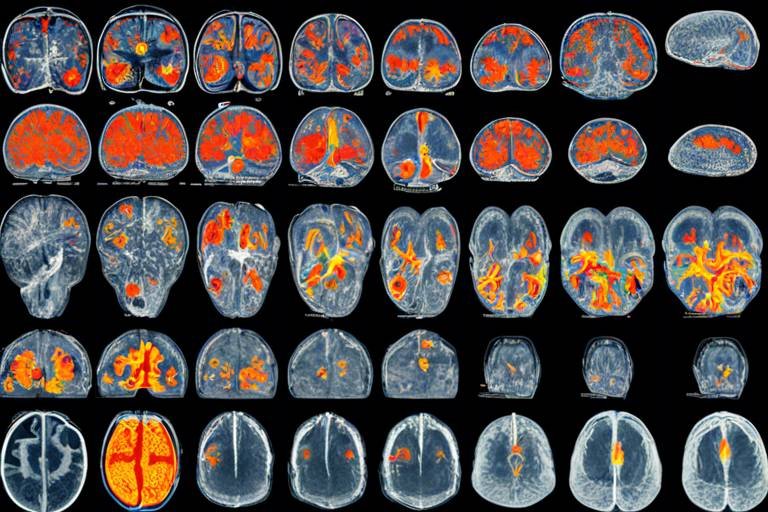How Discoveries in Genetics are Shaping Personalized Medicine
The world of medicine is undergoing a revolution, thanks to groundbreaking discoveries in genetics. Personalized medicine, a tailored approach to healthcare that considers individual genetic profiles, is no longer a distant dream but a rapidly evolving reality. Imagine a world where your doctor knows exactly what treatment will work best for you, based on your unique genetic makeup. Sounds like science fiction, right? Well, it’s happening now! This article delves into how these genetic discoveries are transforming healthcare, enhancing treatment strategies, and ultimately improving patient outcomes.
Genomics, the study of an individual's genes and their functions, is at the heart of personalized medicine. It provides a treasure trove of insights into our genetic makeup, enabling healthcare professionals to craft treatment strategies that are as unique as the patients themselves. By understanding the specific genetic variations that contribute to health and disease, doctors can move away from the one-size-fits-all approach and instead focus on targeted therapies that are more effective and less harmful.
For instance, consider the difference between treating a common cold with a generic medication versus a tailored treatment based on your genetic predisposition to certain viruses. This is the essence of genomics in personalized medicine—it's about making healthcare more precise, efficient, and effective.
Recent advancements in genetic testing technologies have been nothing short of revolutionary. These innovations have transformed how we diagnose and treat diseases, allowing for more accurate predictions and personalized healthcare solutions. With genetic information at our fingertips, we can identify potential health risks before they manifest, paving the way for preventive measures that can save lives.
One of the most significant breakthroughs in genetic testing is Next-Generation Sequencing (NGS). This technology has dramatically increased the speed and accuracy of genetic testing, making it possible to analyze entire genomes quickly and cost-effectively. Imagine being able to sequence your entire genome in a matter of days rather than months! NGS is like having a high-speed train that takes you directly to the destination of understanding your health.
When it comes to cancer treatment, genetic testing through NGS has opened up new avenues for personalized therapies. Oncologists can now select treatments based on specific genetic alterations present in a patient's tumor. This means that instead of using a blanket approach to cancer treatment, doctors can tailor therapies that target the unique characteristics of each tumor. It’s like having a custom-made suit instead of an off-the-rack outfit—fitting perfectly to the individual’s needs.
Another exciting area is pharmacogenomics, which studies how genes affect a person's response to drugs. This field allows healthcare providers to prescribe medications that are not only more effective but also have fewer side effects based on genetic profiles. Imagine taking a medication that works perfectly for you without the unpleasant side effects that others might experience. That’s the promise of pharmacogenomics!
However, with great power comes great responsibility. The rise of genetic testing raises important ethical considerations. Issues such as privacy concerns, informed consent, and the potential for genetic discrimination must be addressed to ensure the responsible use of genetic information. It’s crucial that as we embrace these advancements, we also safeguard individual rights and promote ethical practices in genetic testing.
Despite the incredible promise of personalized medicine, several challenges remain. Integrating genetic data into clinical practice is no small feat. Healthcare systems must grapple with vast amounts of genetic information, requiring advanced computational tools and expertise to translate findings into actionable clinical insights. Think of it as trying to find a needle in a haystack—only the haystack is made of complex genetic data!
Managing and interpreting this data poses significant challenges for healthcare systems. It’s not just about having access to genetic information; it’s about knowing what to do with it. Advanced computational tools and skilled professionals are essential to ensure that genetic findings can be effectively translated into meaningful treatment options.
Equitable access to personalized medicine is another pressing issue. Disparities in healthcare resources and the availability of genetic testing can hinder the benefits of these advancements from reaching all populations. It’s vital that we work towards ensuring that everyone, regardless of their background, has access to the groundbreaking benefits of personalized medicine.
- What is personalized medicine? Personalized medicine is an approach to healthcare that tailors treatment to the individual characteristics, needs, and preferences of patients, often based on their genetic information.
- How does genetic testing work? Genetic testing analyzes DNA to identify changes or mutations that may lead to diseases or affect a person's response to certain medications.
- What are the ethical concerns surrounding genetic testing? Ethical concerns include issues of privacy, informed consent, and the potential for genetic discrimination.
- How can I access personalized medicine? Access to personalized medicine may vary based on healthcare providers and insurance coverage, so it's best to consult with a healthcare professional about available options.

The Role of Genomics in Personalized Medicine
Genomics is not just a buzzword; it's the backbone of personalized medicine. Imagine a world where your healthcare is as unique as your fingerprint. Well, that world is becoming a reality! By delving deep into an individual's genetic makeup, genomics provides invaluable insights that allow healthcare providers to tailor treatment strategies specifically for each patient. This is particularly important because no two people respond to treatments in the same way. With genomics, we can shift from a one-size-fits-all approach to a more precise method that enhances patient outcomes.
At the heart of this transformation is the ability to identify genetic variations that influence how patients respond to medications, how likely they are to develop certain diseases, and what preventive measures might be most effective. For instance, if you have a genetic predisposition to a particular illness, your doctor can recommend lifestyle changes or screenings that are more suited to your needs. This proactive approach is a game changer in modern healthcare.
Moreover, genomics opens the door to targeted therapies. These are treatments designed to specifically attack the genetic abnormalities present in a patient's condition. For example, in cancer treatment, oncologists can analyze the genetic profile of a tumor and select therapies that are most likely to be effective based on those specific genetic alterations. This not only improves the chances of successful treatment but also minimizes the risk of side effects that often accompany traditional therapies.
However, the integration of genomics into personalized medicine is not without its challenges. It requires a robust infrastructure for data management and interpretation. Healthcare providers need access to advanced computational tools and expertise to make sense of the vast amounts of genetic data generated. This is where the intersection of technology and medicine becomes crucial.
In conclusion, the role of genomics in personalized medicine is transformative. It empowers healthcare providers to offer tailored treatment plans that not only improve patient outcomes but also revolutionize the way we think about health and disease. As we continue to unlock the mysteries of our genetic code, the potential for personalized medicine will only grow, making healthcare more effective and accessible to everyone.

Advancements in Genetic Testing
In recent years, the field of genetic testing has experienced a remarkable transformation, driven by cutting-edge technologies and innovative research. These advancements have fundamentally changed how we diagnose and treat various diseases, allowing healthcare providers to move from a one-size-fits-all approach to a more personalized strategy. Imagine being able to tailor medical treatments to fit your unique genetic makeup—this is no longer a distant dream but a reality that is reshaping the landscape of healthcare.
One of the most significant breakthroughs in genetic testing is the advent of Next-Generation Sequencing (NGS). This technology has revolutionized the speed and accuracy with which we can analyze genetic material. Unlike traditional sequencing methods that could take weeks or even months, NGS can process entire genomes in a matter of days, and at a fraction of the cost. This rapid turnaround is crucial, especially in critical care scenarios where timely decisions can make all the difference in patient outcomes.
To illustrate the impact of NGS, consider the following table that highlights its advantages over traditional sequencing methods:
| Aspect | Next-Generation Sequencing | Traditional Sequencing |
|---|---|---|
| Speed | Days | Weeks to Months |
| Cost | Lower | Higher |
| Volume of Data | Whole Genome | Targeted Regions |
| Accuracy | High | Moderate |
Furthermore, the implications of NGS extend beyond just speed and cost. It has opened doors to personalized cancer therapies. Oncologists can now analyze the specific genetic alterations present in a patient's tumor, allowing them to select treatments that are tailored to the individual. This means that instead of a generic chemotherapy regimen, a patient could receive a targeted therapy that directly addresses the mutations driving their cancer. It’s like having a custom-made suit instead of a one-size-fits-all outfit—tailored specifically for you!
Another exciting area of genetic testing is pharmacogenomics, which examines how an individual's genetic makeup influences their response to medications. This field is vital because it allows healthcare providers to prescribe drugs that are not only more effective but also come with fewer side effects. Imagine taking a medication that has been specifically chosen for you based on your genetic profile, minimizing the trial-and-error process often associated with finding the right drug. This is particularly important for patients with chronic conditions who may be on multiple medications.
However, with these advancements comes a responsibility to address the ethical considerations surrounding genetic testing. As we delve deeper into our genetic information, questions of privacy, informed consent, and potential genetic discrimination arise. It’s essential for healthcare providers and policymakers to navigate these issues carefully to ensure that the benefits of genetic testing are accessible and equitable for all.
In conclusion, the advancements in genetic testing are nothing short of revolutionary. They not only enhance our understanding of diseases but also empower patients and healthcare providers to make informed decisions tailored to individual needs. As we continue to explore the vast potential of genetic testing, we must remain vigilant in addressing the accompanying ethical challenges to ensure that this powerful tool is used responsibly and effectively.
- What is genetic testing? Genetic testing involves analyzing DNA to identify changes or mutations that may indicate a genetic disorder or predisposition to certain diseases.
- How does Next-Generation Sequencing work? NGS allows for the simultaneous sequencing of millions of DNA fragments, enabling comprehensive analysis of entire genomes quickly and cost-effectively.
- What is pharmacogenomics? Pharmacogenomics is the study of how genes affect a person's response to drugs, helping to tailor medication choices based on genetic profiles.
- Are there ethical concerns with genetic testing? Yes, ethical concerns include privacy issues, the potential for genetic discrimination, and the need for informed consent.

Next-Generation Sequencing
Next-generation sequencing (NGS) has emerged as a groundbreaking technology that is reshaping the landscape of genetic testing and personalized medicine. Imagine being able to read an entire book of genetic instructions in a matter of hours instead of years—this is what NGS allows us to do! By enabling rapid sequencing of entire genomes, NGS has significantly reduced the cost and time associated with genetic analysis, making it accessible to a broader range of patients and healthcare providers.
The implications of NGS are profound. With its ability to identify genetic variations at an unprecedented scale, healthcare professionals can now tailor treatment plans that are specifically designed to address the unique genetic makeup of each patient. This means that rather than relying on a one-size-fits-all approach, doctors can select therapies that target the specific mutations contributing to a patient’s disease. For instance, in oncology, NGS can help oncologists pinpoint the exact genetic alterations in a tumor, leading to more effective and personalized cancer treatments.
To illustrate the transformative power of NGS, consider the following key advancements:
- Speed: Traditional sequencing methods could take weeks or even months, while NGS can complete the process in just a few days.
- Cost-Effectiveness: The cost of sequencing has dropped dramatically, making it feasible for routine clinical use.
- Comprehensive Analysis: NGS can analyze multiple genes simultaneously, providing a more complete picture of a patient’s genetic profile.
However, with great power comes great responsibility. The rapid advancement of NGS also raises questions about data management and interpretation. With the ability to generate enormous amounts of genetic data, healthcare providers must be equipped with the right tools and expertise to make sense of this information. It’s not just about having the data; it’s about translating it into actionable insights that can truly enhance patient care. This is where the collaboration between geneticists, bioinformaticians, and clinicians becomes crucial.
In summary, NGS is not just a technological marvel; it is a catalyst for change in personalized medicine. By unlocking the secrets of our genetic code, NGS empowers healthcare providers to offer tailored treatments that can lead to better patient outcomes. As we continue to explore the vast potential of this technology, the future of medicine is looking brighter, more personalized, and undoubtedly more effective.

Applications in Cancer Treatment
When it comes to cancer treatment, the integration of genetic testing has opened up a world of possibilities that were once considered science fiction. Imagine a scenario where a patient's treatment plan is tailored specifically to the genetic makeup of their tumor. This is not just a dream anymore; it's a reality made possible by advancements in genetic testing and next-generation sequencing (NGS). By analyzing the unique genetic alterations present in a tumor, oncologists can select therapies that target those specific changes, leading to improved outcomes and fewer side effects.
One of the most exciting aspects of this approach is the ability to utilize targeted therapies. These are medications designed to attack cancer cells based on their specific genetic characteristics. For instance, if a tumor has a mutation in the EGFR gene, a targeted therapy that inhibits this pathway can be administered, often resulting in a more effective treatment than traditional chemotherapy. This precision not only enhances the effectiveness of the treatment but also minimizes damage to healthy cells, making the entire process less grueling for patients.
Moreover, genetic testing allows for the identification of biomarkers that predict how well a patient will respond to certain treatments. For example, the presence of specific mutations can indicate whether a patient is likely to benefit from immunotherapy, a revolutionary treatment that harnesses the body’s immune system to fight cancer. As a result, oncologists can make informed decisions, sparing patients from undergoing ineffective treatments and their associated side effects.
To illustrate the impact of genetic testing in cancer treatment, let's consider a few key advancements:
| Advancement | Description | Impact |
|---|---|---|
| Targeted Therapies | Medications that specifically attack cancer cells based on genetic mutations. | Higher treatment success rates and fewer side effects. |
| Immunotherapy | Using the body’s immune system to recognize and destroy cancer cells. | New hope for patients with previously untreatable cancers. |
| Biomarker Identification | Identifying genetic markers that predict treatment responses. | More personalized treatment plans and better patient outcomes. |
However, while the potential of genetic testing in cancer treatment is immense, it is crucial to recognize that this approach is still evolving. Ongoing research is essential to uncover new genetic markers and understand their implications fully. Additionally, as we embrace these advancements, we must also consider the ethical implications of genetic testing, including patient privacy and the potential for genetic discrimination.
In summary, the applications of genetic testing in cancer treatment represent a significant leap forward in how we approach oncology. With the ability to tailor treatments based on an individual’s unique genetic profile, we are not only enhancing the effectiveness of therapies but also paving the way for a future where cancer treatment is as personalized as it is powerful.
- What is personalized medicine?
Personalized medicine refers to the tailoring of medical treatment to the individual characteristics of each patient, often based on genetic information.
- How does genetic testing help in cancer treatment?
Genetic testing helps identify specific mutations in a tumor, allowing oncologists to choose targeted therapies that are more effective for that particular genetic profile.
- Are there risks associated with genetic testing?
Yes, there can be risks such as privacy concerns, potential discrimination, and the psychological impact of knowing one's genetic predispositions.

Pharmacogenomics
Pharmacogenomics is a fascinating field that merges the worlds of genetics and pharmacology, offering a glimpse into the future of tailored medicine. Imagine a world where your doctor prescribes medication not just based on your symptoms, but on your unique genetic makeup. This is the promise of pharmacogenomics! By understanding how genes influence the way we metabolize drugs, healthcare providers can make smarter choices about which medications to prescribe, optimizing treatment effectiveness while minimizing side effects.
At its core, pharmacogenomics seeks to answer critical questions: Why do some patients respond well to a particular drug while others experience adverse effects? How can we predict which medications will work best for an individual? The answers lie in our DNA. For instance, genetic variations can determine how quickly a drug is metabolized in the body. Some individuals may process certain medications too slowly, leading to toxicity, while others may metabolize them too quickly, resulting in insufficient therapeutic effects. This variability underscores the importance of genetic testing in prescribing practices.
To illustrate, consider the case of antidepressants. Research has shown that certain genetic markers can predict how a patient will respond to different classes of these medications. By analyzing these markers, doctors can select the most suitable antidepressant for their patients, potentially reducing the trial-and-error process that often accompanies mental health treatment. This not only enhances patient satisfaction but also leads to better health outcomes.
Moreover, pharmacogenomics isn't limited to just a few drug categories. It spans a wide range of medications, including those used to treat cancer, cardiovascular diseases, and autoimmune disorders. For example, in oncology, genetic testing can identify specific mutations in tumors that may be targeted by particular drugs, allowing for a more personalized approach to cancer treatment. This shift towards precision medicine is not just a trend; it represents a fundamental change in how we approach healthcare.
However, the implementation of pharmacogenomics in clinical practice does come with its challenges. One major hurdle is the need for widespread education among healthcare providers. Many practitioners may not be familiar with the latest genetic testing technologies or how to interpret the results effectively. Additionally, there are ethical considerations surrounding genetic data privacy, which must be carefully managed to protect patients.
As we move forward, the integration of pharmacogenomics into standard medical practice holds immense potential. With ongoing research and advancements in genetic testing technologies, we are poised to revolutionize the way medications are prescribed and administered. Imagine a future where every prescription is tailored to your genetic profile, optimizing your treatment and enhancing your quality of life. The possibilities are truly exciting!
- What is pharmacogenomics? - Pharmacogenomics is the study of how genes affect a person's response to drugs, allowing for personalized medication choices based on genetic information.
- How does pharmacogenomics improve patient care? - By tailoring drug prescriptions to an individual's genetic profile, pharmacogenomics can enhance treatment efficacy and reduce the risk of adverse drug reactions.
- Are there any risks associated with pharmacogenomic testing? - While pharmacogenomic testing is generally safe, there are ethical concerns regarding privacy and the potential for genetic discrimination that must be addressed.
- How can I access pharmacogenomic testing? - Pharmacogenomic testing is available through various healthcare providers and specialized laboratories; consult with your doctor to see if it's suitable for you.

Ethical Considerations in Genetic Testing
As we dive deeper into the world of genetic testing, it's essential to address the ethical considerations that come along with it. The ability to decode our DNA holds immense potential, but it also raises significant questions about privacy, informed consent, and the risk of genetic discrimination. Imagine having access to information that could not only change your healthcare but also impact your life choices and relationships. This dual-edged sword of knowledge necessitates a careful examination of how we handle genetic data.
One of the primary concerns revolves around privacy. With genetic testing, individuals provide sensitive information about their health and ancestry. This data, if mishandled or accessed by unauthorized parties, could lead to potential misuse. For instance, employers or insurance companies might seek access to genetic information to make decisions that could adversely affect individuals. This brings us to the crucial point of ensuring that robust data protection measures are in place. Individuals must be assured that their genetic information is stored securely and used only for intended purposes.
Another pressing issue is informed consent. Before undergoing genetic testing, patients should fully understand what the process entails, including the potential outcomes and implications of the results. It's not just about knowing whether you carry a specific gene; it's about grasping how that knowledge could affect your life. For example, if someone learns they have a predisposition to a certain condition, they might face emotional distress or anxiety. Therefore, healthcare providers must ensure that patients are adequately informed and supported throughout the testing process.
Furthermore, the potential for genetic discrimination cannot be overlooked. There are fears that individuals with unfavorable genetic markers may face bias in various aspects of life, including employment and insurance coverage. This could lead to a society where people are judged based on their genetic predispositions rather than their actual health status. To combat this, legislation, such as the Genetic Information Nondiscrimination Act (GINA) in the United States, has been enacted to protect individuals from discrimination based on their genetic information. However, ongoing advocacy and education are necessary to ensure that such protections are upheld and expanded.
In summary, while genetic testing offers groundbreaking opportunities for personalized medicine, it is accompanied by a host of ethical challenges that must be navigated with care. Addressing these concerns is not just about protecting individuals; it's about fostering a healthcare environment where everyone can benefit from advancements in genetics without fear. As we continue to explore the potential of genetic testing, we must prioritize ethical considerations to build a system that is both innovative and responsible.
- What is genetic testing? Genetic testing involves analyzing DNA to identify changes or mutations that may lead to genetic disorders or influence health.
- What are the benefits of genetic testing? It can provide valuable information about health risks, guide treatment decisions, and inform family planning.
- How is privacy protected in genetic testing? Strict laws and regulations, such as GINA, help protect individuals from discrimination based on their genetic information.
- What should I consider before undergoing genetic testing? Consider the implications of the results, potential emotional impact, and the importance of informed consent.

Challenges in Implementing Personalized Medicine
While the concept of personalized medicine is incredibly promising, its implementation is not without hurdles. One of the most significant challenges lies in the integration of genetic data into clinical practice. Healthcare providers are often inundated with vast amounts of genetic information, and translating this data into actionable insights requires not only advanced computational tools but also specialized training for healthcare professionals. Imagine trying to navigate a maze without a map; that’s how many doctors feel when faced with complex genetic data. They need a clear path to make informed decisions about patient care.
Another major hurdle is the issue of healthcare disparities. Access to personalized medicine can vary significantly based on geographic location, socioeconomic status, and even racial or ethnic backgrounds. For instance, urban areas may have better access to cutting-edge genetic testing and personalized treatments, while rural communities may lag behind. This inequity raises concerns about whether all populations will benefit equally from advancements in genetics. It’s like having a new, shiny toy that only a select few get to play with while others are left out in the cold.
Moreover, the need for comprehensive education among healthcare providers cannot be overstated. Many practitioners may not fully understand the implications of genetic testing or how to interpret the results in the context of personalized medicine. This gap in knowledge can lead to underutilization of genetic testing and missed opportunities for tailored treatments. To bridge this gap, ongoing education and training programs must be established, ensuring that healthcare providers are well-equipped to utilize genetic information effectively.
Additionally, there are ethical considerations that must be addressed. The rise of genetic testing raises questions about privacy, informed consent, and the potential for genetic discrimination. Patients may worry about how their genetic information will be used and who will have access to it. For example, will their employer or insurance company use this information against them? To foster trust and encourage participation in genetic testing, it is essential to establish robust policies that protect individuals’ rights and ensure the responsible use of genetic data.
In summary, while the potential for personalized medicine is immense, several challenges must be overcome to realize its full benefits. From integrating complex genetic data into clinical practice and addressing healthcare disparities to ensuring that healthcare providers are adequately educated and navigating ethical concerns, the path forward is fraught with obstacles. However, with continued research, policy development, and public awareness, the dream of personalized medicine could very well become a reality for all.
- What is personalized medicine? Personalized medicine is a medical model that tailors healthcare to individual characteristics, particularly genetic profiles, to optimize treatment effectiveness.
- What are the main challenges in implementing personalized medicine? Key challenges include data integration, healthcare disparities, provider education, and ethical concerns.
- How can healthcare providers overcome these challenges? By investing in training, utilizing advanced technology, and advocating for equitable access to genetic testing.
- Why is genetic data important in personalized medicine? Genetic data helps identify the most effective treatments for individuals based on their unique genetic makeup, improving outcomes and minimizing side effects.

Data Management and Interpretation
In the rapidly evolving world of personalized medicine, the management and interpretation of genetic data have emerged as a critical challenge. With the advent of advanced technologies such as Next-Generation Sequencing (NGS), healthcare providers are now able to generate vast amounts of genetic information in a remarkably short time. However, this influx of data can feel like trying to drink from a fire hose. How do we sift through the noise to find meaningful insights that can actually inform treatment decisions?
The first step in effective data management is the organization of genetic information. This involves not just storing the data but also ensuring that it is easily accessible and interpretable by healthcare professionals. Many healthcare systems are now investing in sophisticated data management platforms that can handle the complexity of genomic data. These platforms often utilize artificial intelligence (AI) and machine learning algorithms to analyze genetic sequences, identify patterns, and predict outcomes based on a patient’s unique genetic makeup.
Once the data is organized, the next hurdle is interpretation. Genetic data is not just a series of letters and numbers; it requires a deep understanding of genetics, biology, and the interplay between genes and health outcomes. Healthcare providers must be equipped with the knowledge and tools necessary to translate complex genetic information into actionable insights. This is where collaboration comes into play. Multidisciplinary teams, including geneticists, bioinformaticians, and clinicians, are essential for making sense of the data. Together, they can work to uncover the implications of genetic variations and how they relate to specific diseases or treatment responses.
To illustrate the complexities involved, consider the following table, which summarizes the key components of data management and interpretation in personalized medicine:
| Component | Description |
|---|---|
| Data Collection | Gathering genetic information from various sources, including patient samples and genomic databases. |
| Data Storage | Using secure databases to store genetic data while ensuring compliance with privacy regulations. |
| Data Analysis | Employing AI and machine learning to interpret genetic data and identify relevant patterns. |
| Clinical Application | Translating genetic findings into treatment options, requiring collaboration among healthcare professionals. |
As we continue to unlock the potential of genomics in healthcare, it is imperative that we address these challenges head-on. The integration of genetic data into clinical practice is not just about technology; it also requires a cultural shift within healthcare systems. Providers must be trained not only to understand genetic data but also to communicate its implications effectively to patients. After all, the ultimate goal of personalized medicine is to empower individuals with the knowledge they need to make informed decisions about their health.
In conclusion, while the management and interpretation of genetic data present significant challenges, they also offer incredible opportunities for improving patient outcomes. By harnessing the power of technology and fostering collaboration among experts, we can navigate these complexities and pave the way for a new era of personalized healthcare.
- What is personalized medicine? Personalized medicine tailors medical treatment to the individual characteristics of each patient, often using genetic information to guide decisions.
- How does genetic testing work? Genetic testing analyzes a person's DNA to identify changes or mutations that may cause or increase the risk of disease.
- What are the ethical concerns surrounding genetic testing? Key concerns include privacy, informed consent, and the potential for genetic discrimination by employers or insurers.
- Can everyone access personalized medicine? While advancements are being made, disparities in healthcare access and resources can limit availability for some populations.

Access and Equity in Healthcare
Access to personalized medicine is not just a luxury; it's a fundamental right. Yet, the reality is that many individuals face significant barriers when it comes to benefiting from the latest advancements in genetic research. Imagine a world where your healthcare is tailored specifically to your DNA, but then realizing that only a select few have the means to access these life-changing treatments. This disparity is a pressing issue that demands our attention.
One of the primary factors contributing to inequity in healthcare is the availability of genetic testing. In urban areas, cutting-edge genetic tests may be readily available, while rural communities often lack the necessary facilities or specialists. This geographical divide creates a situation where those living in less accessible areas may not even be aware of their genetic predispositions to certain conditions, let alone have the opportunity for early intervention.
Furthermore, socioeconomic status plays a significant role in access to personalized medicine. Individuals from lower-income backgrounds may find it challenging to afford genetic testing or the subsequent treatments that could be tailored to their genetic makeup. Insurance coverage can also be inconsistent; while some plans may cover advanced genetic testing, others might not, leaving patients to bear the financial burden alone.
To illustrate the impact of these disparities, consider the following table that highlights the differences in access to genetic testing based on various factors:
| Factor | Urban Areas | Rural Areas | Low-Income |
|---|---|---|---|
| Availability of Testing | High | Low | Medium |
| Insurance Coverage | Varies | Limited | Often Excluded |
| Awareness of Options | High | Low | Medium |
Moreover, educational disparities further exacerbate these issues. Many patients may not fully understand the implications of genetic testing or how to interpret the results. This lack of knowledge can lead to missed opportunities for early diagnosis or prevention strategies that could significantly improve their health outcomes. Healthcare providers must step up and ensure that they are not only providing access to genetic testing but also offering comprehensive education about its benefits and limitations.
One potential solution to these challenges is the implementation of community outreach programs. By partnering with local organizations, healthcare providers can offer genetic testing services in underserved areas, ensuring that everyone has the opportunity to benefit from personalized medicine. Additionally, advocating for policy changes that mandate insurance coverage for genetic testing could help bridge the gap for those who currently face financial barriers.
In conclusion, while personalized medicine holds incredible promise, it is essential to address the challenges of access and equity in healthcare. By working together—healthcare providers, policymakers, and communities—we can strive to create a healthcare system where everyone, regardless of their background, has the opportunity to benefit from advancements in genetics. After all, healthcare is not just about technology; it's about people.
- What is personalized medicine? Personalized medicine tailors medical treatment to the individual characteristics of each patient, often using genetic information to guide decisions.
- Why is access to personalized medicine important? Access ensures that all individuals can benefit from advancements in healthcare, leading to better health outcomes and reduced disparities.
- How can we improve access to genetic testing? Community outreach, policy changes, and education initiatives can help make genetic testing more accessible to underserved populations.
Frequently Asked Questions
- What is personalized medicine?
Personalized medicine is a tailored approach to healthcare that considers an individual’s unique genetic makeup, lifestyle, and environment. This method aims to provide more effective and specific treatment options based on a person’s genetic profile, leading to better patient outcomes.
- How does genomics play a role in personalized medicine?
Genomics provides critical insights into an individual's genetic information, enabling healthcare providers to develop customized treatment strategies. By understanding the genetic basis of diseases, doctors can select therapies that are more likely to work for each patient, enhancing the effectiveness of treatments.
- What are the recent advancements in genetic testing?
Recent advancements, particularly in next-generation sequencing (NGS), have transformed genetic testing. NGS allows for rapid and cost-effective analysis of entire genomes, providing healthcare professionals with detailed information that can guide personalized treatment decisions.
- How is genetic testing used in cancer treatment?
Genetic testing is pivotal in cancer treatment as it helps identify specific genetic alterations within tumors. This information enables oncologists to choose targeted therapies that are more likely to be effective for individual patients, leading to improved treatment outcomes.
- What is pharmacogenomics?
Pharmacogenomics is the study of how genes influence a person's response to medications. By analyzing a patient’s genetic profile, healthcare providers can prescribe drugs that are more effective and have fewer side effects, enhancing the overall treatment experience.
- What ethical considerations are associated with genetic testing?
Ethical considerations in genetic testing include concerns about privacy, informed consent, and the potential for genetic discrimination. It is essential to address these issues to ensure that genetic information is used responsibly and ethically in healthcare.
- What challenges are faced in implementing personalized medicine?
Challenges in implementing personalized medicine include integrating genetic data into clinical practice, addressing healthcare disparities, and ensuring that healthcare providers are adequately educated about genetic testing and its implications for patient care.
- How is data managed and interpreted in personalized medicine?
Managing and interpreting the vast amounts of genetic data generated through testing is a significant challenge. Advanced computational tools and skilled professionals are required to translate this data into actionable insights that can inform clinical decisions.
- What are the concerns regarding access and equity in healthcare?
Ensuring equitable access to personalized medicine is crucial. Disparities in healthcare resources and the availability of genetic testing can prevent certain populations from benefiting from advancements in personalized medicine, highlighting the need for broader access across different communities.



















